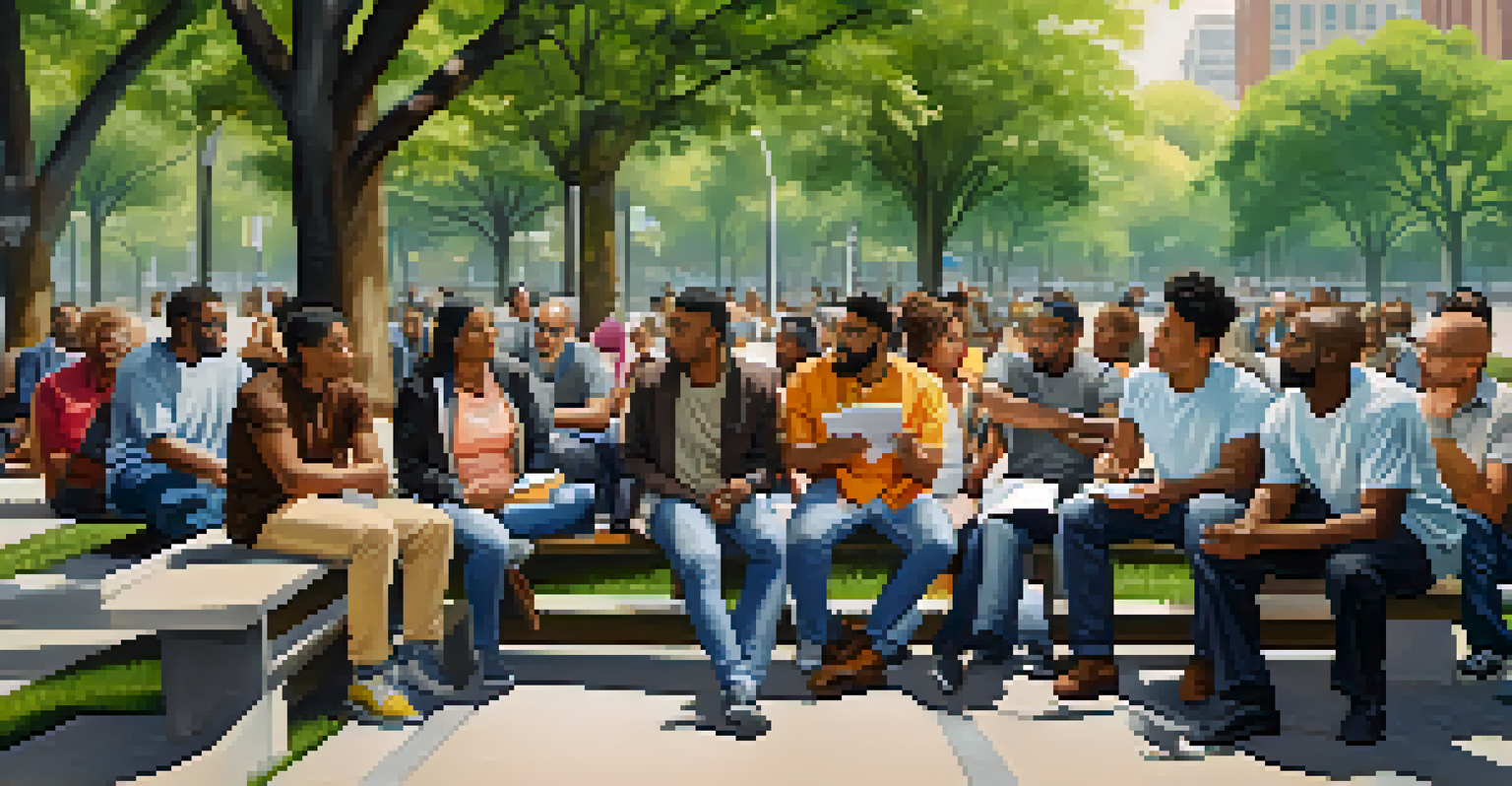Latin America: Diverse Self Defense Laws Explained

Overview of Self Defense Laws in Latin America
Self-defense laws in Latin America can be as diverse as the cultures that inhabit the region. Each country has its own historical context and legal framework, which shapes how self-defense is perceived and regulated. Understanding these laws requires a look into not only the legal texts but also the societal values that influence them.
The law must be a shield to protect citizens from violence, not a sword to punish them for defending themselves.
For instance, some countries consider self-defense as a strict right, while others may have more nuanced interpretations that involve proportionality and necessity. This means that what’s acceptable in one country might not be in another, leading to a patchwork of regulations that can be confusing for citizens and visitors alike. Thus, it’s essential to grasp the fundamental principles that guide these laws.
Moreover, the implications of these laws extend beyond legal consequences; they reflect how societies prioritize safety and personal rights. Whether it's a matter of protecting oneself in a dangerous situation or understanding the legal repercussions of such actions, the differences in self-defense laws are crucial to navigate.
Self Defense in Mexico: A Comprehensive Guide
In Mexico, self-defense is recognized, but it comes with specific conditions. The law stipulates that self-defense must be proportional to the threat faced, meaning that excessive force may lead to legal repercussions. This proportionality principle is crucial, as it underscores the importance of assessing the situation before reacting.

Interestingly, the context of self-defense has evolved in recent years, especially in response to rising crime rates in certain areas. Lawmakers have been under pressure to provide clearer guidelines, leading to reforms aimed at protecting citizens while also preventing abuse of self-defense claims. This balance is essential in a country where many feel the need to protect themselves.
Diverse Self-Defense Laws Across Countries
Self-defense laws in Latin America vary significantly by country, influenced by cultural context and legal frameworks.
As a result, understanding self-defense laws in Mexico isn't just about knowing the legalities; it’s also about recognizing the societal challenges that shape these laws. Citizens must remain informed to navigate the complexities of defending themselves without crossing legal boundaries.
Brazil's Unique Approach to Self Defense Laws
Brazil's self-defense laws are framed within the context of necessary defense, which allows individuals to protect themselves against imminent threats. However, the use of force must still adhere to the principles of necessity and proportionality. This means that if there are less harmful ways to avoid harm, those should be considered first.
Self-defense is not just a legal right; it's a moral imperative to protect oneself and others from harm.
One notable aspect of Brazilian law is the emphasis on the intention behind the defensive actions. If someone acts with the intention to cause undue harm, the legal system may interpret their actions as excessive, regardless of the circumstances. This focus on intention adds a layer of complexity when evaluating self-defense situations.
Additionally, Brazil has seen its share of debates surrounding the effectiveness of its self-defense laws, particularly in urban areas plagued by violence. The ongoing discussions aim to find a balance between protecting citizens and ensuring that the application of self-defense laws does not lead to further violence.
Argentina's Legal Framework for Self Defense
In Argentina, self-defense is legally recognized but is subject to strict conditions. The law requires that any defensive action taken must be immediate and necessary to avert a threat. This means that individuals cannot retaliate after the immediate danger has passed, emphasizing the need for quick judgment in high-pressure situations.
Moreover, Argentinian law also stresses the importance of proportionality, similar to its neighbors. If someone uses excessive force, they may face legal consequences, even if their initial intention was to defend themselves. This creates a challenging environment where individuals must weigh their options carefully before acting.
Proportionality is Key in Self-Defense
Most Latin American nations emphasize the principle of proportionality, requiring that defensive actions match the threat faced.
As in other countries, the societal context in Argentina influences how self-defense laws are interpreted and enforced. With rising crime rates in certain areas, public sentiment often drives discussions about self-defense, leading to calls for reforms that could clarify the legal framework for everyday citizens.
Chilean Self Defense Laws and Social Context
Chile's self-defense laws allow individuals to protect themselves from imminent threats, but they must act within the bounds of necessity and proportionality. The law recognizes that self-defense is justifiable but warns against disproportionate responses that could lead to severe legal consequences. This legal framework seeks to protect citizens while also maintaining public order.
In recent years, Chile has experienced social unrest, leading to broader discussions about personal safety and self-defense. As citizens express concerns over their safety, there’s been an increased interest in understanding how the law applies in real-life scenarios. This backdrop illustrates the tension between the right to defend oneself and the responsibility to uphold societal norms.
Thus, in Chile, self-defense laws are not just about legal definitions; they are also a reflection of the public's desire for security amid changing social dynamics. Citizens are encouraged to stay informed about their rights and responsibilities to navigate these complex laws effectively.
Colombia's Evolving Self Defense Legislation
Colombia's self-defense laws are particularly noteworthy due to the country's history of violence and conflict. The legal framework allows for self-defense under conditions similar to other Latin American nations, emphasizing necessity and proportionality. However, the historical context means that these laws are often scrutinized in light of past abuses.
In Colombia, the concept of self-defense has been shaped by both urban crime and the legacy of armed conflict. This duality complicates how laws are applied and understood, as individuals may feel justified in using force due to their experiences. Hence, the societal narrative around self-defense is deeply intertwined with the country’s ongoing challenges.
Evolving Laws Reflect Societal Changes
As crime rates and social dynamics shift, self-defense laws in Latin America are being re-evaluated to balance individual rights with public safety.
As a result, legal reforms in Colombia have sought to clarify self-defense laws while addressing the broader social implications. Citizens must navigate not only the legal landscape but also the emotional and psychological ramifications of living in a country with a complex history.
Peru's Self Defense Laws: A Closer Look
Peru’s self-defense laws highlight the importance of proportionality, similar to other nations in the region. Individuals are permitted to defend themselves, but any response must be necessary and appropriate to the threat faced. This means the law discourages retaliation or excessive force, aiming to prevent escalation of violence.
Moreover, Peru has seen discussions about the effectiveness of these laws in protecting citizens amidst rising crime. Many people express frustration over their safety, leading to calls for reforms that could better empower individuals to defend themselves legally. These conversations illustrate the ongoing struggle between individual rights and community safety.

In essence, understanding self-defense laws in Peru requires acknowledging the societal pressures that shape these legal frameworks. As citizens engage in dialogues about their rights, they are also navigating the challenges of ensuring personal safety in an ever-changing environment.
The Future of Self Defense Laws in Latin America
As Latin America continues to evolve, so too will its self-defense laws. The ongoing discussions about personal safety, crime rates, and societal values will play a significant role in shaping future legislation. Lawmakers are increasingly aware that citizens are concerned about their ability to protect themselves in a legal and responsible manner.
Moreover, with the rise of social media and public advocacy, there’s a growing demand for transparency and clarity in self-defense laws. People are engaging in conversations about their rights, pushing for reforms that reflect the realities of their daily lives. This shift indicates a more informed and proactive citizenry that seeks to influence legal outcomes.
Ultimately, the future of self-defense laws in Latin America will depend on the balance between individual rights and public safety. As societies continue to grapple with issues of violence and security, the evolution of these laws will reflect a collective desire for both protection and justice.